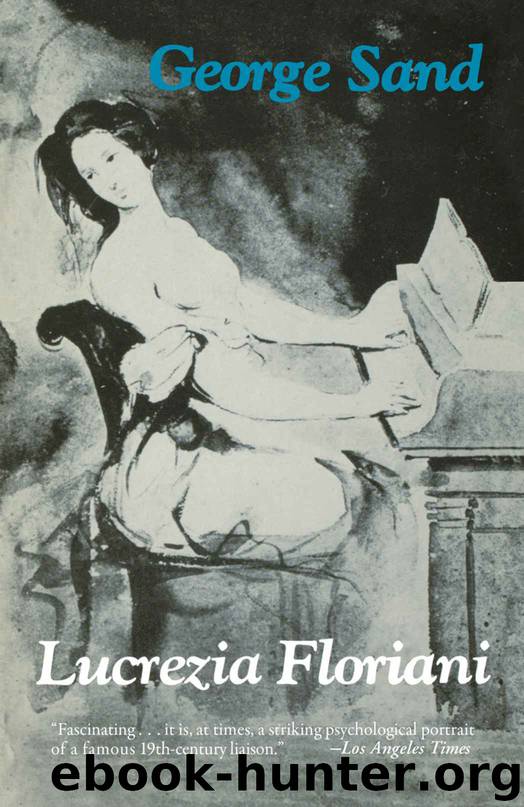Lucrezia Floriani by George Sand

Author:George Sand [Sand, George]
Language: eng
Format: epub
Publisher: Chicago Review Press
Published: 1993-09-30T23:00:00+00:00
16.
“Men are never logical or consistent in their best or their worst qualities,” said Lucrezia, “and in order to avoid passing from one extreme to the other, from an excess of esteem to an excess of blame, in order to preserve affection and trust for those whom duty tells us to love, we must form a fair picture of them, see the good and the bad with some degree of calmness and, above all, remember that in most men a vice is sometimes a virtue carried to extremes.
“My fathers vice is parsimony. I must mention this without delay for otherwise we would not recognise that his virtue is a spirit of equity and a fanatical respect for established rule. Loving money passionately – like all peasants – he is distinguished from them in that the theft of a blade of grass appears as a crime to him. His meanness lies in his eternal fear of waste which leads to destitution. His greatness is this same instinct of avarice put to the service of those whom he loves to the detriment of his own well-being, his health, and almost his life.
“Thus he has amassed – admittedly in a mean and ugly way – a miserable sum, buried no doubt in some recess in the cottage. From time to time he buys small plots of land in the belief that this will ensure the honour and future dignity of his grandchildren. To attempt to persuade him that a good education and talents are a better investment would be utterly futile. Having remained a peasant both in body and soul, he only understands what he sees. He knows how grass grows and seed germinates and without suspecting that that is a greater miracle than all human achievement, he calmly says that it is a natural fact Speak to him of things which can be proved and explained, of a steamship, for example, or a railway, and he will smile and say nothing. He does not believe in the existence of what he has not seen and if he were told to go to the other side of the lake to convince himself of it with his own eyes he would not go for fear it was a hoax.
“My life has taught him nothing of society, the arts, the power of intellectual gifts or the exchange of ideas. He never asks questions about such matters nor does it please him to hear conversations on subjects which are utterly unfamiliar to him. He believes that if I have made a fortune in my artistic career it is due to fortuitous circumstances which he would advise me not to risk again. Then he advances the following argument which is both very plausible and very ingenuous: ‘You artists earn a lot of money, but you need to spend even more. You acquire this taste from associating with one another and from gadding about So that you work to excess to enable you to have a little pleasure. I who spend nothing and have no taste for pleasure earn less, but what I have acquired I keep.
Download
This site does not store any files on its server. We only index and link to content provided by other sites. Please contact the content providers to delete copyright contents if any and email us, we'll remove relevant links or contents immediately.
The 5 Love Languages: The Secret to Love That Lasts by Gary Chapman(9767)
Doing It: Let's Talk About Sex... by Hannah Witton(9271)
Should I Stay or Should I Go? by Ramani Durvasula(7642)
The Road Less Traveled by M. Scott Peck(7579)
The Lost Art of Listening by Michael P. Nichols(7485)
Daring Greatly by Brene Brown(6494)
Beartown by Fredrik Backman(5723)
We Need to Talk by Celeste Headlee(5604)
Men In Love by Nancy Friday(5223)
The Rules Do Not Apply by Ariel Levy(4946)
The State of Affairs by Esther Perel(4707)
How To Win Friends and Influence People by Dale Carnegie(4495)
Reflections Of A Man by Mr. Amari Soul(4271)
Pillow Thoughts by Courtney Peppernell(4265)
The Ethical Slut by Janet W. Hardy(4235)
Algedonic by r.h. Sin(4052)
Surrounded by Idiots by Thomas Erikson(3996)
He's Just Not That Into You by Greg Behrendt & Liz Tuccillo(3874)
I Love You But I Don't Trust You by Mira Kirshenbaum(3857)
